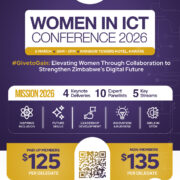The Postal and Telecommunications Regulatory Authority of Zimbabwe (Potraz) is spearheading a bold initiative to expand digital inclusion by relocating co‑located mobile network towers from densely covered urban zones to underserved and unserved rural areas.
Speaking at the WSIS+20, Potraz Director General Machengete explained that the regulator is actively working with mobile network operators to bridge the connectivity gap.
“We’ve noticed that operators are mostly concentrated in lucrative areas like towns. We’ve put in place a policy whereby we’re relocating towers from where they’re co‑located, taking them to underserved areas,” he said.
By Ruvarashe Gora
Under the policy, operators are now required to share infrastructure instead of erecting multiple towers in the same locality. Potraz is funding the relocation process, ensuring that redundant towers in over‑served zones are redeployed to communities that have long been left out of the digital economy.
Industry analysts say the move could transform rural access, cutting costs for operators while bringing high‑speed mobile services to areas with little or no coverage. According to Potraz, the strategy forms part of its broader drive to create an equitable digital landscape and support the transition towards a knowledge‑based society.
The relocation program comes as Zimbabwe accelerates universal access projects, with Potraz urging operators to embrace infrastructure‑sharing and invest in innovative rollout models. For rural entrepreneurs, students, and health facilities, the arrival of new towers could mean a lifeline unlocking mobile money, e‑learning, telehealth, and other digital services previously out of reach.














Comments